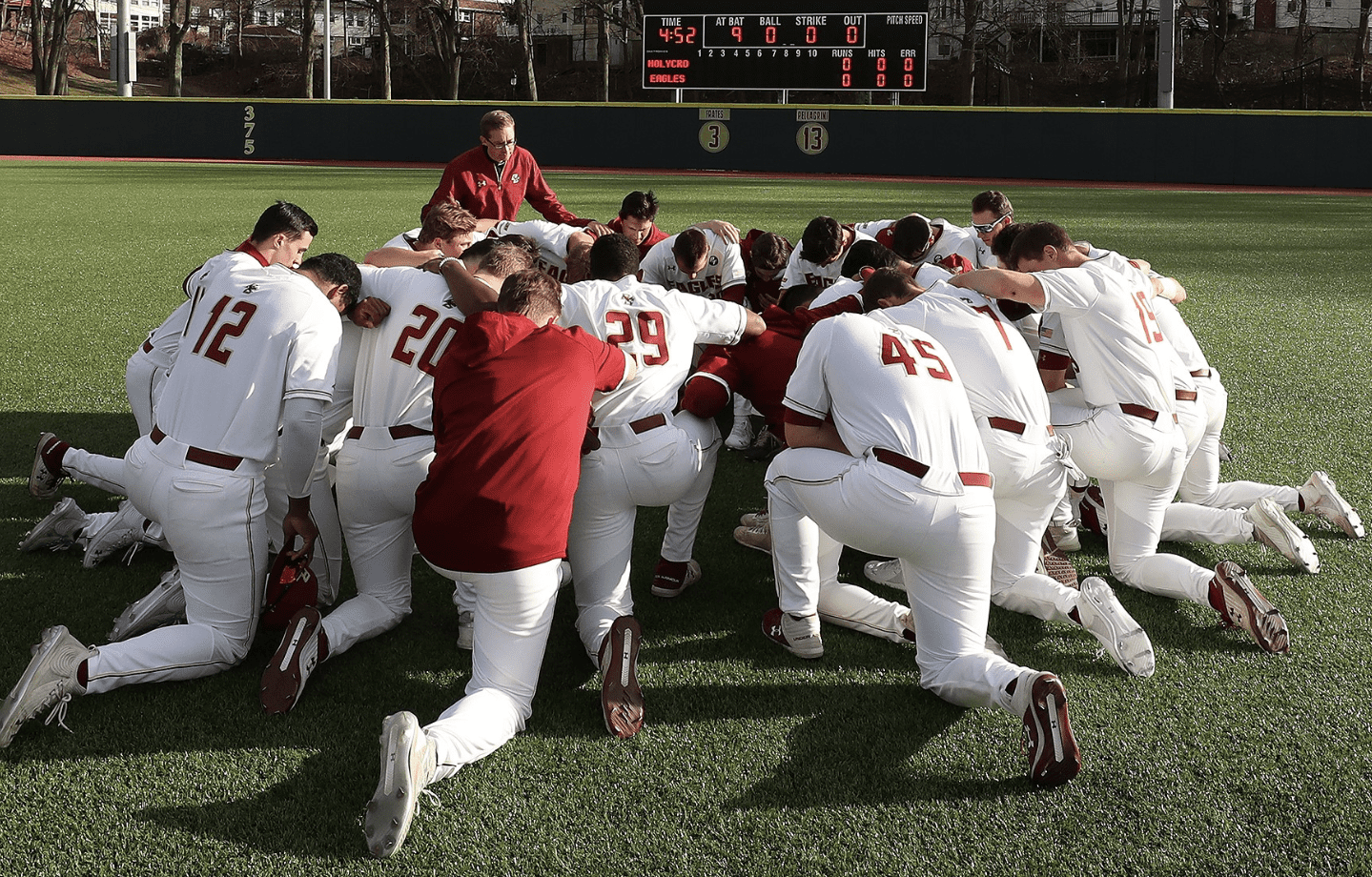And the crowd goes wild
“Well, I’ve never seen anything like this before,” I muttered. After a real slobberknocker that sent a player to the turf and the crowd howling, the athletic director stormed onto the field, stared down the crowd, and began to speak.
“This is a high school soccer game!”, he yelled. “This is supposed to be fun! Tone this down right now. You’re getting the players all riled up!”
The crowd lowered their gaze in embarrassment. They knew their jeers had gone too far. After a few moments of tense silence, the AD walked back across the field and retook his seat. The bewildered referee glanced at the coaches and signaled to restart play. For a moment, at least, the fevered intensity of the match had dissipated.
It didn’t last long. The stakes were just too high. Verbum Dei Jesuit High School in Los Angeles was tied 1-1 against the best team in the league, and a win today would keep us in playoff contention. After a few minutes of calm, a Verb player slide tackled Mary Star’s right forward from behind, sending the fouled player to the ground grabbing his ankle. The sidelines immediately erupted with indignant cries.
I shot a knowing look to the rest of the coaching staff; there was only one player who would make such a reckless challenge. With a piercing whistle, the ref ran to the spot of the foul and issued a yellow card to Sebas 1, our senior attacking midfielder who held the inevitable title of team leader in yellow card bookings.
Sebas didn’t take his yellow card well. He contested the call, yelling at the ref and the Mary Star players who came running towards him like iron filings to a magnet. The ref —his authority undermined by the athletic director’s unprecedented “time out” just a few minutes earlier— reached for his pocket to issue a red card to eject our player.
“Sebas!”, I yelled.
“Breathe!”
“You lose your cool, we lose this game!”
Somehow, through the fog of war, the truth of these words registered. He took a deep breath, gathered himself, and walked towards our bench to be subbed out. The situation now defused, the referee returned his cards to his breast pocket, delivered a strong word of caution to our team captain, and whistled to resume play. We breathed a collective sigh of relief.
After a few minutes to cool off, we reminded him not to let the team down by earning a red card, and subbed him back in. It worked. A calmer, more level-headed Sebas immediately delivered a beautiful through ball to an overlapping midfielder who buried the game-winning goal into the side netting. The crowd went wild.
After the game, our elated striker Damari 2 led the team in prayer. “Dear God, thanks for the dub!” he prayed. The team was beaming. He continued with the customary Our Father and concluded, “St. Ignatius of Loyola…”
“Pray for us!” the team thundered in reply. The grace of the moment was palpable.
Red light. Green light.
What had gotten into Sebas? He never would have committed such a reckless tackle in an intersquad scrimmage or in a pick-up game in the park. But with his senior season on the line, with the cheers of the crowd ringing in his ears, with the score tied against the top team in the league, his nerves got to him and he lost his cool.
His outburst was precipitated by what coaches call “Red Light”—a rattled state of mind that makes it impossible to play with composure. “Under pressure,” the baseball psychologist Ken Ravizza writes, “many hitters revert to a caveman approach – they swing from their heels like they’re trying to crush a dinosaur’s skull.” Anyone who has played sports at a high level knows what Ravizza is talking about. Carefully crafted game plans vanish from the mind. Primal emotion kicks in. Players make unforced errors and blow up at the ref.
The art of coaching lies in helping athletes stay out of Red Light and in the balanced, equilibrated mindset of Green Light on gameday. Rather than deer in the headlights anxiety, Green Light players exude the Holy Spirit’s fruits of “love, joy, peace, patience, kindness, generosity, faithfulness, gentleness, and self-control” (Gal 5:22-23). The game becomes fun again. The occasional missed call or unlucky bounce doesn’t faze them. They find themselves in flow and make clutch performances under pressure.
Green Light players have an easy come, easy go, attitude towards results dictated by outside factors. The batter who sees the pitch clearly, makes good contact, but lines out, feels no shame walking back to the dugout. A soccer player who clears his mind and strikes a dipping freekick well, only to have the goalkeeper make a postage stamp save simply says, “Wow, what a stop!” as he jogs back towards the midfield stripe. A quarterback whose pass is knocked away in a circus act show of athleticism by the defense rejoins the huddle with his head held high. When you compete in Green Light, you can turn the page even when you notch a loss. Losing is painful,” writes Ken Ravizza, “but when the opponent beats you, you can sleep okay. When you beat yourself, you stare at the ceiling all night.”
Athletes who have learned how to reach the serenity of Green Light are well prepared mentally for the inevitable trials of life. When broadened to include the spiritual plane, we Jesuits call this mindset “indifference.” The late Howard Gray, SJ, puts it this way:
“For Ignatius, the foundational human experience was freedom: freedom from all created reality and freedom for God’s ownership over a person’s life. This kind of spiritual balance—i.e., freedom from and freedom for—he called ‘indifference.’”
By letting go of what is beyond our control and cultivating Ignatian indifference, we grow in our ability to find more rooted, freer ways of being in the world. It is only from this deep wellspring of unpossessive equanimity that true and lasting virtue can emerge.
How sports can build character
Sadly, sports do not always help athletes grow in the virtues of self-control, resilience, and sportsmanship. In fact, a poorly run athletics program can have precisely the opposite effect. If coaches don’t explicitly focus on character development, many athletes will emerge from their athletic programs having learned impunity and selfishness rather than fair play and teamwork.
This is unacceptable. The distinguished historian John O’Malley, SJ, notes that character development has been a centerpiece of Jesuit education since the very beginning. O’Malley writes that, for the first Jesuits,
“The purpose of this schooling was not so much the pursuit of abstract or speculative truth, which is what the universities pursued, as the character formation of the student, an ideal the humanists encapsulated in the words pietas—not to be translate as ‘piety,’ though it included it, but as ‘upright character.’”
Former Superior General of the Jesuits Fr. Peter Hans Kolvenbach puts it this way: “The real measure of our Jesuit universities lies in who our students become.” Sports play a pivotal role in this mission of developing students who will live up to their God-given potential. All the honor codes and Christian ethics courses in the world are useless if athletic directors and coaches reward cheating and selfishness on the field.
At its best, sports teach players to put the team ahead of their own egos. Legendary UCLA basketball coach John Wooden once observed that “ten strong horses could not pull an empty baby carriage if they worked independently of each other.” There is no better place than team sports to learn the truth of this statement.
Examples of this collaborative, other-focused attitude are sorely missing in today’s world. In Fratelli Tutti, Pope Francis bemoans the rise of ‘monads’, a sort of moral ball hog that sow division and fragmentation as they become “increasingly unconcerned with others.” (FT 111). In the context of sports, coach Bruce Brown dubs these individuals ‘wheelbarrows’, because “they have to be pushed, and they get upset easily.” Nothing is more destructive to schools, parishes, and families than these sorts of selective participants who delude themselves into believing that it’s more important that they ‘win’ than that the team ‘wins’.
This point is captured well by Servant of God Pedro Arrupe’s dictum that Jesuit schools must form “men and women for others.” Education, from the Latin educere, means “to draw out.” True education always draws students away from narrow provincialisms and into –to paraphrase Greg Boyle– more expansive circles of kinship. Schooling that measures its success merely by the private wealth, power, and status amassed by its graduates is emphatically not Jesuit; indeed, it’s not even education.
Sports hold the potential to develop a spirit of teamwork, fairness, discipline, hard work, perseverance, composure, asceticism, commitment, conflict resolution, preparation, and resilience in the face of adversity—but only if these virtues are celebrated with the same earnestness as a walk-off homerun or a winning touchdown pass.
When coaches emphasize character development, athletes come to know the wisdom of St. Paul’s exhortation to the Philippians: “Do nothing from selfish ambition or conceit, but in humility regard others as better than yourselves.” (Phil 2:3). No high school sports program is truly successful if it graduates players that are selfish and conceited. Winning championships is nice, but character development is mission critical.
Early in the 2021 season, Verbum Dei running back Semaj Harris had more rushing yards than any other high school player in the nation. The football program’s remarkable achievements were chronicled in a flattering article in the LA Times. When Verb extended their unbeaten season to 4-0 in a big win over Beverly Hills High School, Semaj and head coach Kevin Smith were interviewed on CBS. Such attention could easily have gone to his head and stoked the flames of selfish ambition and conceit. Instead, when asked to comment on his senior season, Semaj simply replied that growing up in Compton and going to school at Verbum Dei in Watts had taught him the importance of “staying humble and knowing that you are blessed.”
Why do Jesuit schools love sports? Because they develop good moral character. Semaj learned to keep sinful pride in check during a surge of media attention. Sebas forged a new degree of self-mastery in a heated league match. Humility and self-control will stay with these young men long after they finally hang up their cleats. These are the victories most worth celebrating. These are the dubs that truly give glory to God.
-//-
Photo of Tim Breen, SJ leading the BC baseball team in a prayer.


